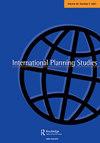城市非正规性和平行治理系统:塑造孟加拉国公民参与城市规划过程
IF 1.5
Q4 REGIONAL & URBAN PLANNING
引用次数: 3
摘要
发展中国家城市规划实践中的非正规性不再是城市贫困普遍存在的同义词,而是与各种形式的权力和财富积累有关。本文揭示了非正规性和由此产生的平行治理系统如何阻碍社区参与地方发展。它描述了非正规性在达卡特大城市地方规划的三个领域中的作用,即城市服务提供、战略规划和城市发展。根据各种来源的报道,我们认为,享有特权的公民可能会无视正式的规划系统,在符合他们利益的地方,他们会求助于平行系统来规避监管。这种情况进一步恶化,因为平行系统的存在阻碍了城市穷人参与正式规划进程。一些人失去了对政府的信任,完全避免参与,而另一些人则通过中间商寻求非正式渠道,以获得有利的结果。本文章由计算机程序翻译,如有差异,请以英文原文为准。
Urban informality and parallel governance systems: shaping citizens’ engagements in urban planning processes in Bangladesh
ABSTRACT Informality within the urban planning practice in developing countries is no longer synonymous to the prevalence of urban poverty but rather also associated with various forms of power and wealth accumulation. This paper uncovers how informality and resulting parallel governance systems discourage community participation in local development. It describes the role of informality in three areas of local planning in Dhaka megacity, viz. urban service delivery, strategic planning and urban development. Reporting from a variety of sources, we contend that privileged citizens are likely to disregard the formal planning system and where it serves their interest, they resort to the parallel system to circumvent regulatory controls. The situation is further aggravated because the existence of parallel systems discourages the urban poor to participate in formal planning processes. Some lose their trust in the government and avoid participation altogether, while others seek informal access to it through middlemen for favourable outcomes.
求助全文
通过发布文献求助,成功后即可免费获取论文全文。
去求助
来源期刊

International Planning Studies
REGIONAL & URBAN PLANNING-
CiteScore
4.60
自引率
4.80%
发文量
20
期刊介绍:
Planning, at urban, regional, national and international levels, faces new challenges, notably those related to the growth of globalisation as both an objective socio-economic process and a shift in policy-maker perceptions and modes of analysis. International Planning Studies (IPS) addresses these issues by publishing quality research in a variety of specific fields and from a range of theoretical and normative perspectives, which helps improve understanding of the actual and potential role of planning and planners in this context.
 求助内容:
求助内容: 应助结果提醒方式:
应助结果提醒方式:


